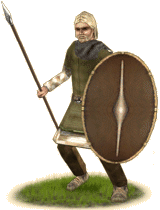Voinu are fierce infantry spearmen who form the bulk of the armies of the Neuri and Boudinoi. They wear no armor, but their large, oval shields afford substantial protection and they are brave, wild warriors that make very tough opponents. In addition, they inhabit harsh terrain, forest, rivers and swamps, which is not suitable for cavalry warfare, but that they can use to their advantage. Therefore, their tactical doctrine was probably similar to that of their later descendants, the Central European Slavs, who lived and fought under similar conditions: the deployment of spearmen defended by big shields and backed by packs of skirmishers armed with sturdy bows. When in a favorable ground, the wild courage of these tribesmen and their terrifying reputation (the claims of their being cannibals appear to have had a solid basis) are added to the picture, the resulting combination is one than can prove very difficult to defeat.
Historically, Herodotos wrote about the Neuri and Boudinoi and placed them as northern neighbours of the European Scythians. Nowadays, many historians think they occupied the swamps and forests of Prippet and the upper Dnieper and associate them with advanced archeological cultures of the area. Features of those cultures are the use of iron weapons and a substantial influence from their southern Scythian neighbours. Some scholars consider the Neuri and Boudinoi the earliest known ancestors of the Proto-Slavs. In that case, their warrior class would have been plausibly called "Voinu", a proto-slavic word for "Warrior". In any case, they were fierce and wild opponents and cannibalism was apparently not foreign to them. Markings of teeth on human bones have been found in excavations and Herodotos wrote of the Androphagoi, the man-eaters. They are possibly the basis of the evil werewolves, man-eating wolf-people of later Slavic legend. In the historical past, whoever fought those tribes knew what terrible fate would befall them if they lost.








 Reply With Quote
Reply With Quote Indeed. Combined with Bastarnae Falxmen, they are great vs. heavy infantry or melee cavalry. If you want to go totally badass, you can also combine them with Worgozez.
Indeed. Combined with Bastarnae Falxmen, they are great vs. heavy infantry or melee cavalry. If you want to go totally badass, you can also combine them with Worgozez. 





 from Hannibal Khan the Great, Brennus, Tellos Athenaios, and Winsington III.
from Hannibal Khan the Great, Brennus, Tellos Athenaios, and Winsington III.







Bookmarks